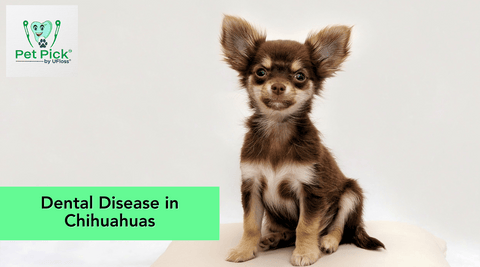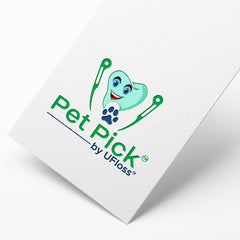Signs of Pet Dental Problems: Recognizing the Signals of Oral Health Issues
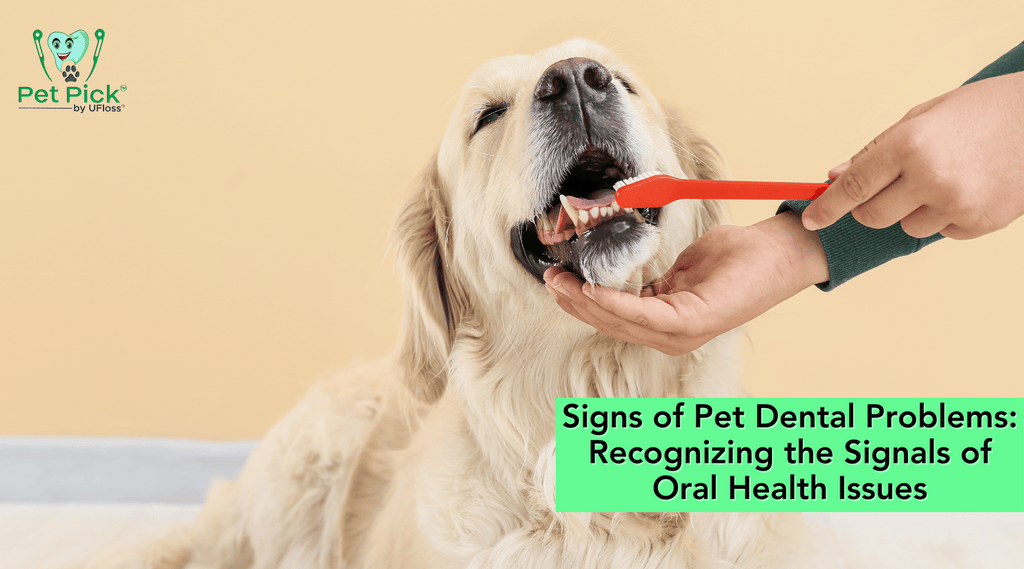
Recognizing and addressing dental issues can prevent serious dental problems that can be costly and painful to treat
Pet ownership is a source of immense joy, companionship, and unconditional love. However, it also entails responsibilities, one of the most crucial being the care of your furry friend's dental health. Neglecting this aspect can lead to severe consequences, with pet dental problems affecting over 80% of dogs and 70% of cats over the age of three. In this article, we've shed light on the signs of pet dental issues, why they matter, and how a simple yet revolutionary solution like Pet Pick can safeguard your pet's well-being.
Signs of Pet Dental Problems
Pet dental problems often go unnoticed until they progress to more severe stages. However, there are several telltale signs that can indicate your pet is experiencing dental discomfort or underlying oral health issues. Recognizing these signs early on can make a significant difference in preventing more serious problems down the road.
- Overly Stinky Breath: Bad breath isn't just an inconvenience; it's often a sign of underlying dental issues. If your pet's breath is consistently foul, it's time to take notice. Halitosis, or bad breath, is caused by the buildup of bacteria in the mouth, which can lead to plaque, tartar, and gum disease.
- Bleeding Gums: Healthy gums should be firm, pink and free from bleeding. If you observe blood during play or while your pet eats, it may indicate gum disease, a common precursor to more serious oral problems. Gum disease, also known as periodontal disease, is an inflammation of the gums and supporting structures of the teeth.
- Pawing at the Mouth: Pets may try to communicate discomfort by pawing at their mouths. This gesture can signify pain or irritation, signaling a need for immediate attention. Excessive pawing at the mouth can be a sign of dental pain, toothache or even oral abscesses.
- Decreased Appetite: If your pet is suddenly showing a decreased appetite or reluctance to eat, it could be due to dental pain or discomfort. Painful chewing or swallowing can make eating a frustrating and unpleasant experience for your pet.
- Weight Loss: Unexplained weight loss, especially in conjunction with other signs like decreased appetite or lethargy, could be a symptom of underlying dental problems. Oral infections can contribute to weight loss by affecting nutrient absorption and increasing the body's metabolic rate.
- Drooling: Excessive drooling, especially with a foul odor, can be a sign of dental problems. Drooling is a natural response to pain or irritation in the mouth, and it can also be a way for your pet to clear away plaque and debris.
The Prevalence of Pet Dental Issues
Pet dental problems are not isolated cases; they are widespread and, unfortunately, often underestimated. Shockingly, as many as 80% of dogs and 70% of cats have some form of periodontal disease by the tender age of two. These statistics underscore the urgency of proactive dental care.
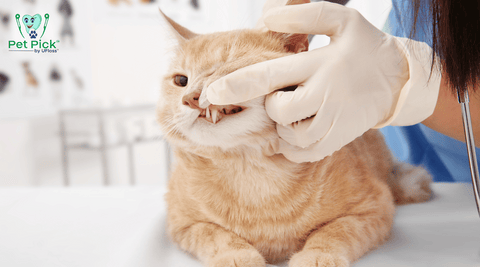
Periodontal disease is the most common chronic infection in pets, affecting the gums and supporting structures of the teeth. It starts with plaque buildup, a sticky film of bacteria that can harden into tartar. Tartar can irritate the gums, leading to inflammation, bleeding, and eventually, the destruction of gum tissue and bone.
Understanding the Impact of Pet Dental Problems
The consequences of untreated dental issues extend beyond bad breath and tartar buildup. Recent studies reveal a connection between oral health and systemic well-being. Oral bacteria, if left unchecked, embark on a journey through your pet's bloodstream, potentially causing serious problems in the heart, kidneys, and even the liver.
Studies have shown that pets with periodontal disease are more likely to develop heart disease, kidney disease, and liver disease. Oral bacteria can enter the bloodstream through inflamed gums and travel to other organs, causing inflammation and damage. And knowing facts about your pet's breed cannot be overstated. For instance, Chihuahuas are more likely to require dental care compared to other dog breeds due to their small oral cavities and overcrowded teeth. So stay informed!
How Pet Pick Addresses Pet Dental Problems
Enter Pet Pick – a revolutionary solution in pet dental care. Traditional methods, including finger toothbrushes, often fall short, especially when it comes to cleaning hard-to-reach areas between teeth. Pet Pick, with its unique design and gentle yet effective action, is specifically designed to tackle the root of the problem.
Pet Pick is a veterinary-recommended dental tool that effectively removes plaque and food debris from teeth and between teeth, reducing the likelihood of dental diseases, keeping teeth clean and strengthening gums. It is a simple, effective and pain-free solution for pet oral health.
Incorporating Pet Pick into Your Pet's Routine
Using Pet Pick is a breeze. Simply insert the pick between your pet's teeth and gently move it back and forth to remove plaque and food debris. The soft, flexible bristles reach deep into the crevices between teeth, effectively removing stubborn debris and plaque buildup. The ergonomic design makes it easy to hold and maneuver, even in hard-to-reach areas.
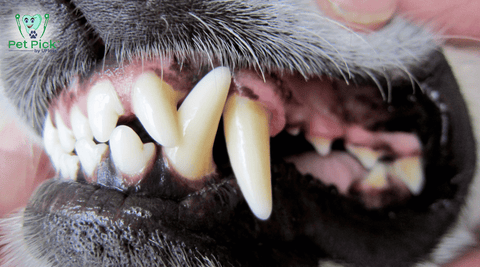
Start by introducing the Pet Pick gradually. Let your pet sniff and examine it, and offer praise and treats to encourage positive association. Once your pet is comfortable with the pick, gently insert it between their teeth and move it back and forth. Begin with short sessions and gradually increase the duration as your pet becomes more accustomed to the process.
Connecting Oral Health to Systemic Well-Being
The link between oral health and systemic diseases is not to be taken lightly. Ignoring pet dental problems can lead to severe consequences, affecting vital organs such as the heart, kidneys, and liver. Your pet's well-being is on the line, and Pet Pick is here to safeguard against these potential risks.
By effectively removing plaque and tartar, Pet Pick helps prevent the buildup of harmful bacteria that can enter the bloodstream and travel to other organs. This, in turn, reduces the risk of developing heart disease, kidney disease, and liver disease. Maintaining good oral health is not just about having a clean mouth; it's about ensuring your pet's overall health and well-being.
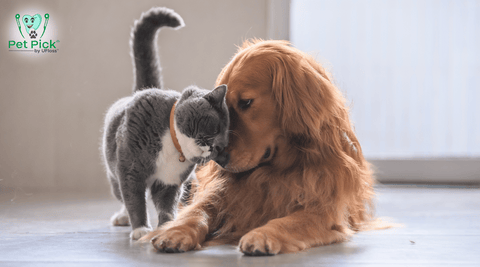
The Pet Pick Difference
Pet Pick goes beyond dental care; it's a promise of optimal oral health and overall well-being for your beloved companion. By effectively removing plaque, addressing critical areas between teeth and promoting stronger, healthier gums, Pet Pick is the best solution for pet dental care.
Unlike traditional dental tools that can be uncomfortable or even painful for pets, Pet Pick's gentle yet effective design ensures a positive and stress-free dental care experience. Plus, its ease of use makes it a convenient and hassle-free addition to your pet's daily routine.
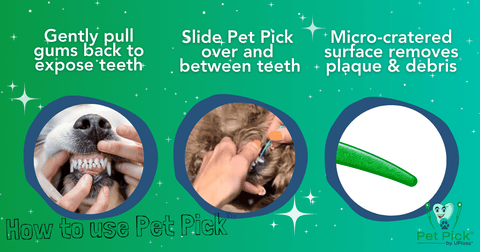
Recognizing the signals of oral health issues is not just about a pet's smile; it's about ensuring a long, healthy life for your furry friend. With pet dental problems affecting a staggering percentage of pets, the time to take action is now. Pet Pick is your ally in this endeavor, providing a simple, effective and revolutionary solution for maintaining your pet's oral health. Don't wait until the consequences become dire – make Pet Pick a part of your pet care routine today.
By incorporating Pet Pick into your pet's daily routine, you're not just taking care of their teeth; you're investing in their overall health and well-being. Give your pet the gift of a healthy, happy smile with Pet Pick – the revolutionary dental solution that makes pet oral care a breeze.


